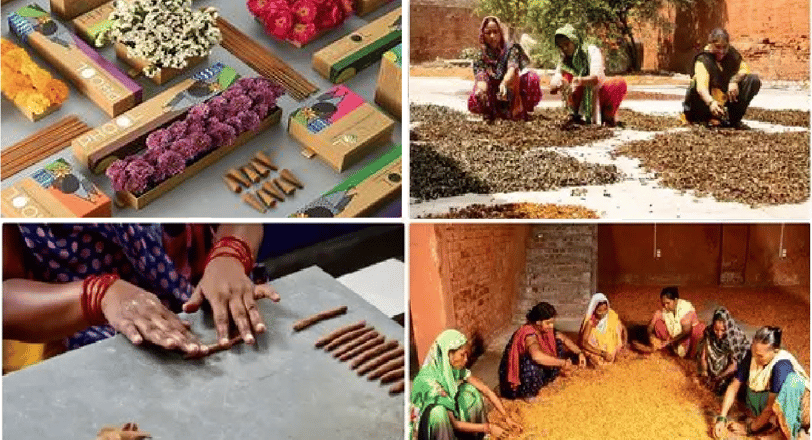The Blooming Revolution: Karan Rastogi’s Journey with ‘Help Us Green’
From Floral Waste to Fragnant Dhoop
ENVIRONMENTAL CONSERVATION


The Blooming Revolution: Karan Rastogi’s Journey with ‘Help Us Green’
In the heart of Kanpur, where the Ganges flows with both reverence and neglect, Karan Rastogi embarked on an extraordinary mission. His venture, Help Us Green, was more than a startup—it was a movement to transform religious rituals into sustainable practices.
Rastogi, a graduate from Warwick Business School (UK), envisioned sustainability within religious practices. Armed with a passion for innovation, he reunited with his childhood friend Ankit Agarwal. Together, they began collecting flower waste from the Ganges banks, where vibrant petals once offered prayers now lay discarded.
“Once I started going to the temple, I saw a huge heap of flowers lying outside the temple where cow, goats and dogs and monkeys litter the entire place,” said Rastogi, adding, “Initially when we started, we collected about ten to 15 kilos because no one believed that it is possible.”
Their vision was clear: recycle this floral debris into something meaningful. Incense sticks and organic vermicompost emerged from the transformation, but they aimed higher.
Blooms and Blessings
The missing piece was the packaging. Hindus wouldn’t toss paper adorned with divine images into a dustbin; it would find its way back to the sacred river. So, they invented a paper infused with tulsi seeds—a paper that could be planted after use. This ingenious idea completed their recycling loop: flowers turned to ashes as incense, and the paper sprouted into a medicinal and religious herb.
“And in our Hindu mythology, there is a very beautiful line which is tera tuchko arpan,” he added.
Rastogi and Agarwal's journey began in a Math tuition class during their school days. Fate reunited them as adults, and their shared passion for innovation ignited the spark. Agarwal, armed with an Engineering degree and a Master’s in Innovation Management, returned to Kanpur after working at Symantec Corporation.
The Ripple Effect
Help Us Green’s impact extends beyond the tangible. Local women's self-help groups joined the cause, collecting waste and crafting products. The term “flowercycle” became their trademark, symbolising rebirth and renewal. As the tulsi plant sprouted from that sheet of paper, Rastogi knew their work was ready to bloom.
Today, the fragrance of incense wafts through temples and homes, carrying the essence of riverside blooms. Help Us Green stands as a testament to innovation, spirituality, and environmental stewardship. Karan Rastogi’s restless spirit found purpose, and the Ganges witnessed a blossoming revolution—one petal at a time.
Funding and Bootstrapping
Rastogi and Agarwal initially relied on their personal savings and ongoing revenue to kickstart Help Us Green. They were determined to create something impactful without external funding. Bootstrapping allowed them to maintain control over their vision and operations. “We used to go to different competitions as students and win those competitions to raise money,” he said. They didn’t want to compromise their eco-friendly ethos by giving away ownership interests to investors.
As they recycled flower waste into incense sticks and organic vermicompost, they realized that packaging was crucial. Hindus wouldn’t discard paper with divine images; it would end up back in the river. Thus, the idea of infused tulsi seeds into paper was born—a paper that could be planted after use.
Their innovative paper, infused with tulsi seeds, completed the recycling loop. Flowers turned to ashes as incense, and the paper sprouted into a medicinal and religious herb.
The first shoot of the Tulsi plant signaled that their work was ready to be showcased to the world. It was a 100% complete project where nothing went to waste.
For more insights, do visit www.helpusgreen.com.
